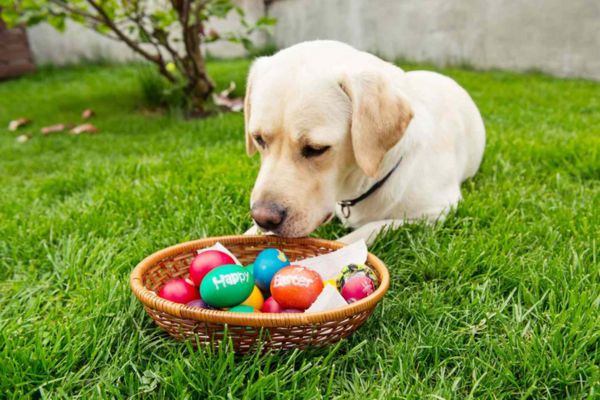Games For Dogs: DIY Easter Egg Hunt
Dogs are often considered to be man's best friend, and as pet owners, we want to ensure they have a happy and fulfilling life. One way to do so is by engaging them in activities that stimulate both their physical and mental abilities.
With Easter just around the corner, why not plan a DIY Easter egg hunt for your furry friend? Not only will it be a fun activity for both you and your dog, but it will also allow them to use their instincts of sniffing and searching. In this guide, we'll discuss the benefits of organizing an Easter egg hunt for dogs, the materials needed, how to plan the hunt, and some safety precautions to keep in mind.
Benefits Of An Easter Egg Hunt For Dogs
An Easter egg hunt for dogs can provide numerous benefits for your furry friend. Firstly, it allows them to engage in physical activity and burn off excess energy. Dogs are natural hunters and enjoy using their senses to explore and search for things. An Easter egg hunt will stimulate this instinct and keep them mentally stimulated.
Moreover, an Easter egg hunt is a great way to bond with your dog and strengthen your relationship. Spending fun and quality time together can help build trust and deepen the bond between you and your furry friend.
An Easter egg hunt can also serve as a training activity for your dog. You can use the hunt to practice basic commands such as "sit,""stay," or "wait." This not only adds a level of difficulty to the hunt but also reinforces positive behaviors and obedience in your dog.
Lastly, an Easter egg hunt can be a great way to introduce your dog to new scents and objects. By hiding treats or toys in different locations, your dog will have the opportunity to explore and discover new things, which can help boost their confidence and curiosity.
How To Plan A DIY Easter Egg Hunt For Dogs

Planning a DIY Easter egg hunt for dogs is relatively easy and only requires a few materials. Firstly, gather some plastic eggs that can be easily opened and closed. Next, fill the eggs with dog-friendly treats or toys. You can also add some of your dog's favorite food items such as cheese or carrot pieces for added excitement.
Next, choose a location for the hunt. Ideally, it should be in an open space where your dog can freely move and explore without any obstructions. Make sure to also consider the weather and plan accordingly.
Once you have all the materials and location, it's time to hide the eggs! Start with simple hiding spots such as behind trees or bushes, and gradually increase the difficulty as your dog becomes more experienced in finding the eggs.
Lastly, set a time limit for the hunt to keep it fun and engaging. You can also have multiple rounds with different treats and hiding spots to keep your dog entertained.
Safety Precautions
While an Easter egg hunt for dogs can be a fun and exciting activity, it's important to keep some safety precautions in mind. Firstly, ensure all the treats used are dog-friendly and safe for consumption. Avoid using any small or sharp objects that can potentially harm your dog.
Secondly, supervise your dog at all times during the hunt to ensure they don't ingest any plastic eggs or accidentally consume too many treats.
Lastly, if your dog has any health conditions or allergies, it's best to consult with your veterinarian before organizing the hunt. They can guide suitable treats and any precautions that need to be taken.
Also, make sure to provide plenty of water for your dog during and after the hunt to keep them hydrated.
Does Your Dog Enjoy The Hunt?
Every dog is unique, and not all of them may enjoy an Easter egg hunt. Some dogs may be easily frustrated or overwhelmed by the activity, while others may get too excited and lose focus. It's important to observe your dog's behavior during the hunt and make any necessary adjustments to ensure they are having a good time.
Also, take into consideration your dog's age and physical abilities. Avoid making the hunt too challenging for older dogs or those with mobility issues.
Plus, don't force your dog to participate if they are showing signs of discomfort or disinterest. It's important to respect their preferences and find other ways to engage and bond with them.
And remember, the most important thing is to have fun and enjoy this special activity with your furry best friend! So, why not give it a try and see how much your dog loves their very own Easter egg hunt?
Why Easter Egg Hunts Aren't Just For Kids
Easter egg hunts have long been a popular activity for children during the Easter holiday, but who says they can't be enjoyed by our furry friends too? Dogs are intelligent and social creatures that thrive on mental and physical stimulation. An Easter egg hunt provides both of these elements, making it an ideal activity for dogs.
Moreover, an Easter egg hunt is a great way to involve your dog in holiday celebrations and traditions. It allows them to feel included and part of the family, which can help reduce feelings of separation anxiety or loneliness.
Plus, it's a unique and fun way to bond with your dog and create lasting memories together. So why not add an Easter egg hunt for dogs to your list of holiday traditions and make it a fun annual event for you and your furry friend? It's sure to be an egg-cellent time! As always, make sure to prioritize safety and have plenty of treats and water on hand for your dog. Happy hunting!
Should You Consider Organizing An Easter Egg Hunt For Dogs?
Organizing an Easter egg hunt for dogs can be a great way to provide mental and physical stimulation, strengthen the bond with your dog, and involve them in holiday celebrations. However, it's important to consider whether this activity is suitable for your specific dog.
If your dog has any health conditions or allergies, it's best to consult with your veterinarian before organizing the hunt. Additionally, if your dog has a history of aggression or possessiveness over food, an Easter egg hunt may not be the best activity for them.
Furthermore, it's important to respect your dog's preferences and make adjustments as needed during the hunt. If your dog becomes frustrated or disinterested, it's best to end the activity and find other ways to engage with them.
Also, make sure to follow safety precautions and supervise your dog at all times to ensure a fun and safe experience for everyone involved. With proper planning and consideration, an Easter egg hunt for dogs can be a rewarding and enjoyable activity for you and your furry best friend.
Mistakes To Avoid When Planning A DIY Easter Egg Hunt For Dogs

While planning a DIY Easter egg hunt for dogs may seem simple, some common mistakes can turn the activity into a frustrating experience.
Here are some things to avoid when organizing a hunt for your furry friend:
- Using treats that are not dog-friendly: Make sure to only use treats that are safe and healthy for your dog.
- Hiding eggs in dangerous or hard-to-reach places: Avoid hiding eggs in areas where your dog could potentially get hurt, such as inside bushes or under heavy objects.
- Not supervising your dog: Always keep an eye on your dog during the hunt to ensure they don't ingest any plastic eggs or overconsume treats.
- Making the hunt too difficult: Start with simple hiding spots and gradually increase the difficulty to keep your dog engaged without getting frustrated.
- Not considering your dog's preferences and abilities: Respect your dog's preferences and make adjustments as needed to ensure they are having a good time. Additionally, consider their age and physical abilities when setting up the hunt.
By avoiding these mistakes, you can ensure a safe and enjoyable Easter egg hunt for dogs that your furry friend will love. Have fun and happy hunting!
FAQs
Should I Use Real Eggs For My Dog's Easter Egg Hunt?
No, it is not recommended to use real eggs for your dog's Easter egg hunt. Real eggs can easily break and make a mess, as well as pose a choking hazard for your dog. It's best to stick with plastic or homemade paper mache eggs filled with dog-friendly treats.
Can I Reuse The Same Eggs For Future Hunts?
Yes, you can reuse the same eggs for future hunts. Just make sure to clean and sanitize them before storing them away. This will help prevent any potential contamination from previous hunts.
How Many Treats Should I Hide During The Hunt?
It is recommended to hide no more than 10-15 treats for your dog's Easter egg hunt. Too many treats can lead to overconsumption and potential digestive issues. You can also mix in non-food items, such as toys or puzzle games, for added mental stimulation.
How Do I Ensure My Dog's Safety During The Hunt?
To ensure your dog's safety, it is important to supervise them at all times during the hunt. Additionally, make sure to use safe and healthy treats, avoid hiding eggs in dangerous places, and consider your dog's preferences and abilities when setting up the hunt.
Conclusion
Easter egg hunts for dogs can be a fun and rewarding activity for both you and your furry friend. It provides mental and physical stimulation, strengthens the bond between you two, and adds joy to holiday celebrations. Just make sure to plan, prioritize safety, and consider your dog's individual needs for a successful and enjoyable hunt.
Additionally, remember to have fun and take lots of pictures to capture the special moments shared between you and your dog during this egg-citing activity. Happy hunting! of Document









Leave a comment